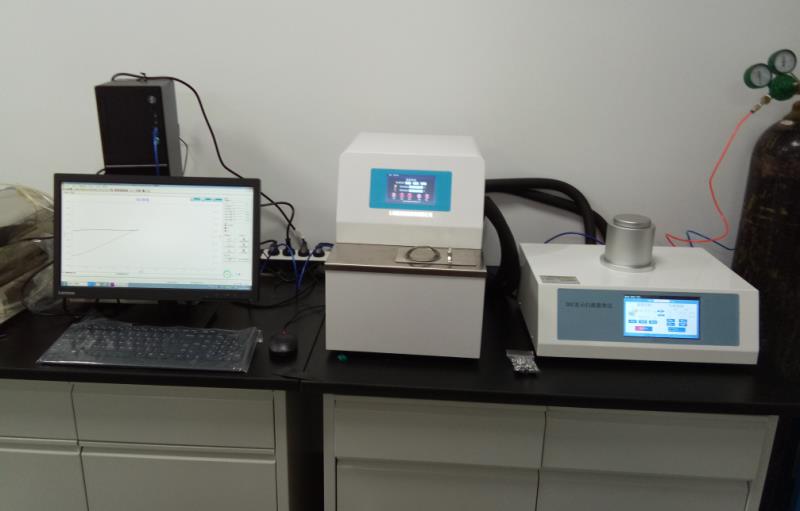DSC-N DSC Differential Scanning Calorimeter
NO:Touch Screen, Oxidation induction time test and Melting point test, Liquid Nitrogen Cooling System, Temperature range :We"re here to help:
Easy ways to get the answers you need. Send E-mail WhatsAPP/Wechat
+86-15254140530
Easy ways to get the answers you need. Send E-mail WhatsAPP/Wechat
+86-15254140530
DSC-N Oxidation induction time test and Melting point test
Temperature range : -100 °C ~ 500 °C, Liquid Nitrogen Cooling System
1. Simple Introduction
The differential scanning calorimeter is a touch screen type, which can perform glass transition temperature test, phase transition test, melting and enthalpy value test, product stability, and oxidation induction period test.
2. Application Range
Differential scanning calorimeter, which measures the relationship between temperature and heat flow related to the internal thermal transition of materials, has a wide range of applications, especially research and development, performance testing and quality control of materials. The characteristics of materials, such as glass transition temperature, cold crystallization, phase transition, melting, crystallization, product stability, curing / cross linking, oxidation induction period, etc., are all research areas of differential scanning calorimetry.
Application of differential scanning calorimeter: curing reaction temperature and thermal effect of polymer materials, determination of material phase transition temperature and thermal effect, crystallization of polymer materials, measurement of melting temperature and thermal effect, vitrification of polymer materials Transition temperature
3. Test Standards:
GB / T 19466.3- 2009 / ISO 11357-3: 1999 Part 6: Determination of oxidation induction time (isothermal OIT) and oxidation induction temperature (dynamic OIT) during the oxidation induction period;
GB / T 19466.2- 2004 / ISO 11357-2: 1999 Part 2: Determination of glass transition temperature;
GB / T 19466.3- 2004 / ISO 11357-3: 1999 Part 3: Determination of melting and crystallization temperature and enthalpy.
4. Technical Parameters
Temperature range : -100 °C ~ 500 °C, Liquid Nitrogen Cooling System
1. Simple Introduction
The differential scanning calorimeter is a touch screen type, which can perform glass transition temperature test, phase transition test, melting and enthalpy value test, product stability, and oxidation induction period test.
2. Application Range
Differential scanning calorimeter, which measures the relationship between temperature and heat flow related to the internal thermal transition of materials, has a wide range of applications, especially research and development, performance testing and quality control of materials. The characteristics of materials, such as glass transition temperature, cold crystallization, phase transition, melting, crystallization, product stability, curing / cross linking, oxidation induction period, etc., are all research areas of differential scanning calorimetry.
Application of differential scanning calorimeter: curing reaction temperature and thermal effect of polymer materials, determination of material phase transition temperature and thermal effect, crystallization of polymer materials, measurement of melting temperature and thermal effect, vitrification of polymer materials Transition temperature
3. Test Standards:
GB / T 19466.3- 2009 / ISO 11357-3: 1999 Part 6: Determination of oxidation induction time (isothermal OIT) and oxidation induction temperature (dynamic OIT) during the oxidation induction period;
GB / T 19466.2- 2004 / ISO 11357-2: 1999 Part 2: Determination of glass transition temperature;
GB / T 19466.3- 2004 / ISO 11357-3: 1999 Part 3: Determination of melting and crystallization temperature and enthalpy.
4. Technical Parameters
| NO. | Parameters Name | Details |
|
|
Temperature range | -100 ℃ ~ 500 ℃ |
|
|
Temperature resolution | 0.01 ℃ |
|
|
Temperature accuracy | 0.1 ℃ |
|
|
Heating rate | 0 ~ 100 ℃ / min |
|
|
Cooling rate | 0 ~ 100 ℃ / min |
|
|
Temperature control mode | heating (heating wire), cooling (liquid nitrogen), constant temperature, any combination of the three modes, the temperature is continuously uninterrupted |
|
|
Constant temperature | room temperature ~ 500 ℃ |
|
|
Constant temperature time | recommended <24h |
|
|
DSC range | 0 ~ ± 500mW |
|
|
DSC resolution | 0.01mW |
|
|
DSC sensitivity | 0.1mW |
|
|
Calorimetric resolution | 0.01mW |
|
|
Calorimetric accuracy | ± 0.1% |
|
|
Calorimetric accuracy | ± 1% |
|
|
Working power | AC 220V 50Hz or customized |
|
|
Atmospheric control gas | nitrogen oxygen (automatic switching of the instrument) |
|
|
Gas flow | 17.: 0-200mL / min |
|
|
Gas pressure | 0.2MPa |
|
|
Optional crucible | aluminum crucible Φ6.6 * 3mm |
|
|
Parameter standards | Equipped with standard materials (indium, tin, zinc), users can correct the temperature and enthalpy by themselves |
|
|
Data interface | standard USB interface |
|
|
Display mode | 24bit color, 7 inch LCD touch screen display |
|
|
Output method | computer and printer |







 Jinan Focus Test Instrument Co., Ltd.
Jinan Focus Test Instrument Co., Ltd.

 Jinan City, Shandong Province, China
Jinan City, Shandong Province, China 